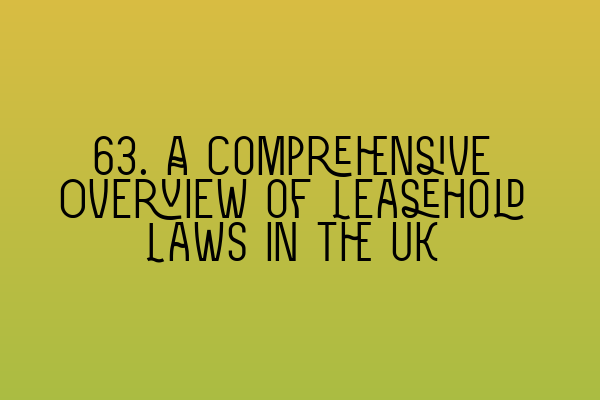63. A Comprehensive Overview of Leasehold Laws in the UK
Welcome to the blog of SQE Property Law & Land Law, where we provide informative and helpful articles on various legal topics. In this post, we will be discussing leasehold laws in the UK. Whether you are a property owner, tenant, or legal professional, understanding leasehold laws is crucial in navigating the world of property transactions. So, let’s dive in and explore the intricacies of leasehold laws in the UK.
What is a Leasehold?
In the UK, leasehold is a form of property ownership where a person owns the right to occupy a property for a specified period known as the lease term. The leaseholder does not own the land on which the property stands; instead, they have a leasehold interest in the property, which allows them to use and possess the property subject to certain conditions and restrictions.
Leasehold properties are typically found in the form of flats, apartments, and some houses. It is essential to understand that leasehold is different from freehold ownership, where the owner holds complete ownership of both the property and the land it sits on.
Leasehold vs. Freehold
Understanding the difference between leasehold and freehold is crucial for anyone looking to buy or sell a property. Freehold ownership grants the owner complete ownership and control of the property, including the land it sits on, indefinitely. On the other hand, leasehold ownership offers limited rights and is subject to the terms and conditions outlined in the lease agreement.
While freehold ownership provides more freedom and control, leasehold ownership has its advantages, such as shared responsibilities for maintenance and repair costs, access to communal facilities, and potentially lower upfront purchase costs.
Leasehold Reform Acts
Leasehold laws in the UK have evolved over time to provide protection and rights for leaseholders. The key legislation governing leasehold properties includes the Leasehold Reform Act 1967, the Leasehold Reform, Housing and Urban Development Act 1993, and the Commonhold and Leasehold Reform Act 2002.
These acts have introduced various rights for leaseholders, such as the right to extend the lease term, the right to purchase the freehold of their property (known as enfranchisement), and the right to challenge unfair service charges.
Rights and Responsibilities of Leaseholders
As a leaseholder, it is crucial to understand your rights and responsibilities to ensure you can effectively manage your leasehold property. Some common rights and responsibilities include:
- The right to quiet enjoyment of the property
- The responsibility to pay ground rent and service charges
- The right to be consulted on major works and repairs
- The responsibility to maintain the property in good condition
- The right to challenge unreasonable service charges
It is important to note that leaseholders have the right to seek legal advice and assistance in cases where their rights are not being upheld or if they have concerns about the lease agreement.
Lease Extensions
Leaseholders have the right to extend their lease term under certain conditions. The process for lease extensions is governed by the Leasehold Reform, Housing and Urban Development Act 1993. This act provides leaseholders with a statutory right to extend their lease by an additional 90 years, subject to eligibility requirements and payment of a premium.
It is essential to seek professional advice when considering lease extensions, as the process can be complex, and failure to follow the correct procedures can result in costly delays or disputes.
Buying and Selling Leasehold Properties
Buying or selling a leasehold property involves certain considerations that differ from freehold transactions. It is important for both buyers and sellers to be aware of the rights and obligations associated with leasehold ownership.
For buyers, it is crucial to review the terms of the lease agreement, including the remaining lease term, ground rent obligations, service charge provisions, and any potential restrictions. Conducting thorough due diligence and seeking legal advice can help identify any potential issues or concerns before completing the purchase.
For sellers, providing accurate and comprehensive information about the leasehold property to potential buyers is essential. This includes disclosing any known issues, upcoming major works, or disputes that may affect the property’s value or desirability.
Conclusion
Leasehold laws in the UK play a crucial role in regulating the rights and responsibilities of leaseholders. Understanding these laws is essential for property owners, tenants, and legal professionals involved in property transactions.
If you need guidance or legal advice regarding leasehold laws or any other property-related matter, please feel free to contact us. Our team of experienced solicitors specializes in property law and can provide expert advice tailored to your specific circumstances.
For more information on property law and preparation for the SQE exams, check our related articles:
- SQE 1 Practice Exam Questions
- SQE 1 Practice Mocks FLK1 FLK2
- SQE 2 Preparation Courses
- SQE 1 Preparation Courses
- SRA SQE Exam Dates
Thank you for reading, and we hope you found this comprehensive overview of leasehold laws in the UK informative!
